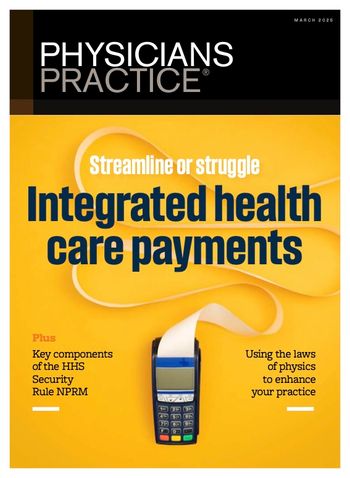
Technology & AI
Latest News
Latest Videos

CME Content
More News

Discover 10 low‑cost, proven strategies to spark joy, boost morale and slash turnover among your medical practice staff, elevating productivity and patient satisfaction.

Discover eight practical, low-cost marketing strategies to help medical practices attract new patients, boost visibility, and grow sustainably in today’s competitive healthcare landscape.

Remote patient monitoring is rapidly expanding, but with heightened federal scrutiny and OIG audits underway, medical practices must ensure full compliance to protect revenue and reduce audit risk.

Your weekly dose of wisdom from the Physicians Practice experts.

Stephen A. Dickens, JD, MAEd, FACMPE, VP of medical practice services at SVMIC, discusses how President Trump's tariffs could trigger a chain reaction for independent practices.

Neal K. Shah, CEO of CareYaya Health Technologies and co-founder of Counterforce Health, joins the show to talk about claim denials and how AI can help fight them.

Your weekly dose of wisdom from the Physicians Practice experts.

Discover expert strategies for medical practices to manage rising supply and device costs driven by inflation and tariffs.

Healthcare organizations face ongoing challenges in leadership retention, engagement, and recruitment amid financial pressures, evolving career expectations, and a shifting talent landscape.

Your weekly dose of wisdom from the Physicians Practice experts.

Neil Baum, MD, gives actionable interview tips to help you take your career to the next level.

Rohit Harve of PA Consulting talks tariffs and their impact on the medical device industry.

Your weekly dose of wisdom from the Physicians Practice experts.

Doctors are dealing with a ton of challenges all at once, and seeing their reimbursement shrink while costs to do business increase is a major problem.

Neil Baum, MD, gives tips on dealing with difficult callers at your medical practice.

Technology offers promising solutions to alleviate administrative challenges and free up valuable time for clinicians to focus on direct patient care.

Your weekly dose of wisdom from the Physicians Practice experts.

The reality is that if you try to do two things at the same time, you won't do either well. It's a trajectory to get less done.

Ericka Adler, JD, of Roetzel & Andress, joins the show to discuss factors you should consider before selling your practice.

Your weekly dose of wisdom from the Physicians Practice experts.

Discover how Gen Z’s emphasis on mental health, digital fluency, and flexibility compares to Baby Boomers, Gen X, and Millennials—and what it means for building a thriving, multigenerational healthcare workforce.

Neil Baum, MD, explains how you can move your practice from focusing on quantity of care to quality of care.

How evolving workplace attitudes are transforming healthcare staffing, as COVID-19 accelerates trends like remote work, mental health support, and modernized technology.

Your monthly collection of insights from the Physicians Practice Pearls writers is available now!

Norman K. "Kip" Beals III, MD, joins the show to discuss the evolving landscape of health care reimbursement — and how physicians can weather the storm.













